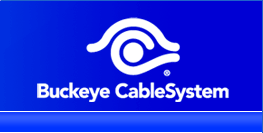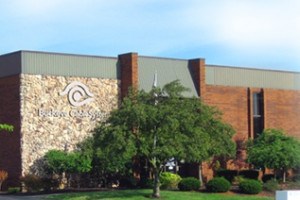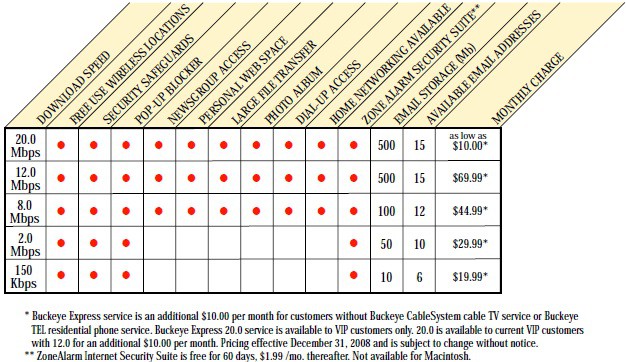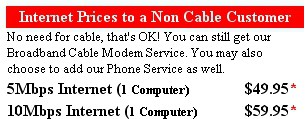 Charter Cable, which has been in Chapter 11 bankruptcy since March 28, has been among the worst hit cable operators by an American economy in trouble, accusations of poor service, excessive executive compensation, and spiraling debt. Before entering bankruptcy protection, the company had $21 billion in debt — a significant amount for a cable operator serving just 5.5 million customers in 27 states.
Charter Cable, which has been in Chapter 11 bankruptcy since March 28, has been among the worst hit cable operators by an American economy in trouble, accusations of poor service, excessive executive compensation, and spiraling debt. Before entering bankruptcy protection, the company had $21 billion in debt — a significant amount for a cable operator serving just 5.5 million customers in 27 states.
Company founder Paul Allen, a co-founder of Microsoft who controlled 91 percent of Charter Cable before bankruptcy, will control just 35 percent of the company as it emerges from reorganization in the coming weeks. Allen’s attention will then turn to the bankruptcy of another one of his concerns – Digeo Inc., which is best known for its Moxi HD DVR.
Despite the bankruptcy, Charter Cable aggressively continues to upgrade its broadband service to DOCSIS 3 in many of its service areas, introducing new faster broadband products to customers. But broadband service from Charter is just one of three services they offer customers, and many are not satisfied with the service they are getting.
Beyond bankruptcy, Charter Cable continues to face bad press for providing poor service, hassling customers with aggressive telemarketing calls, dramatic rate increases, and in one shocking incident this week, a Charter Cable technician in Victorville, California was attacked and killed while on a service call.
Authorities are still searching for a motive for Monday’s unprovoked attack on 25-year-old Trevor Neiman, of Phelan, California. After surviving three tours of duty in Iraq, Neiman was killed with a small hammer in a Victorville home. Police say the attack came from a relative of the homeowner who was visiting at the time of the assault. The suspect, Hesperia resident Johnny Acosta, 45, was arrested on suspicion of murder a short time after fleeing the scene.
“There was no exchange of words. There was nothing that occurred before the unprovoked attack,” said Jody Miller, a spokeswoman for the San Bernardino County Sheriff’s Department told KTLA News.
[flv width=”600″ height=”336″]http://www.phillipdampier.com/video/KABC Los Angeles Charter Cable Installer Killed With Hammer 11-10-09.flv[/flv]
KABC-TV Los Angeles shares the tragic story of Charter Cable technician Trevor Neiman, and the devastating impact Monday’s attack had on his wife and family. (2 minutes)
Beyond that horrific incident, Charter Cable has been irritating subscribers with a series of rate increases and annoying marketing campaigns across the country.
In West Covina, California Charter Cable is ridding itself of senior discounts and also dramatically increasing rates. Broadcast basic cable customers face a whopping $10 monthly increase in their cable bill, and the more popular expanded basic service will increase by $5.25 a month. The company claims the rate increases are part of “an investment in improving the overall customer service experience.”
Resident Hermine Deemer, 83, told the San Gabriel Valley Tribune her bill will increase to $67 a month from $53 – a 26 percent hike.
“That’s a big increase,” Deemer said. “Nobody gets that big of an increase. I know things go up but not that much.”
Charter Cable is calling customers trying to market bundled services including broadband and telephone, claiming the savings from bundling services together would be “higher than the senior discount ever gave.”
Deputy City Manager Chris Freeland said the city has received several calls on the increases but there is little they can do about it.
“We would much rather have the senior discount,” Freeland said. “It’s really beyond our control. The economy is tough and every little dollar for seniors is so precious.”
Customers commenting on the rate increase have encouraged seniors to cancel service and switch to DISH Network satellite service, and several seniors lament they are housebound and television is their primary window to the outside world. With no increase in Social Security in 2010 and increasing medical costs, many seniors will face difficulty coping with the rate increases.
In Pendleton, Oregon, the city attorney blasted Charter Cable for a $5 increase in broadcast basic service (providing local broadcast channels and some public affairs cable networks) and a $3 increase in expanded basic, claiming it unfairly falls on those least able to afford it, all to subsidize discounts on their bundled service packages. Peter H. Wells wrote an open letter to Charter Cable published in the East Oregonian:
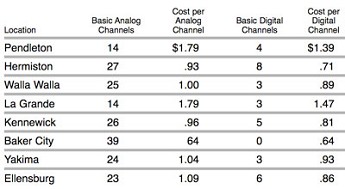
Per-channel costs for Charter Cable in the Pacific Northwest
By imposing the same $5.00 increase for all service tiers and, in fact, a lower increase for those with expanded basic service, the basic tier customer is paying for a greater portion of the company’s total costs than before the fee increase.
Through February 2005, less than five years ago, basic tier service cost the customer $12.91 per month. The rate change effective in December to $24.99 per month is such that those customers will have had a 93 percent rate increase in the past five years. It also appears that Pendleton’s basic tier customers are paying the same for less service than basic tier customers in other nearby service areas.
Charter representatives claim that the service charge increases over the past few years were to compensate the company for upgrades to the physical plant in Pendleton. I believe that argument is not appropriate. The physical plant upgrades were to allow Charter to provide additional services of telephone, digital cable and Internet. The cost of those upgrades should be borne by the users of those services, not the basic tier customers on whom the increase is being disproportionately imposed.
Unfortunately, Charter Cable’s rates are not within the control of the city management, so Wells could only ask that concerned residents contact Charter Cable and complain.
At least one customer fed up with Charter’s marketing practices found g0ing to a local TV station’s consumer watchdog reporter was even more effective.
Carole McGuire of Madison, Wisconsin turned down Charter’s relentless marketing of their “digital phone” product, which she doesn’t currently purchase. Despite her disinterest, the visiting salesman left an application, and called her the next day to see if she changed her mind. After that, McGuire began receiving a barrage of automated phone calls from Charter claiming she ordered the service, and needed to obtain third party verification to meet Federal Communications Commission obligations and process her order.
Not having placed an order, she ignored the calls, but they kept coming… over and over.
Exasperated, she turned to WISC-TV’s On Your Side reporter Erick Franke to see if he could get Charter to stop calling her.
[flv width=”530″ height=”316″]http://www.phillipdampier.com/video/WISC Madison Charter Cable Telemarketing 11-3-09.flv[/flv]
WISC-TV Madison’s On Your Side segment from November 3rd helps a Madison resident put a stop to annoying Charter Cable telemarketing efforts. (3 minutes)
Unfortunately, not even TV stations are immune from dealing with problems with Charter Cable. About a month ago, residents in Clarksville, Tennessee discovered WKAG-TV in nearby Hopkinsville, Kentucky missing from their cable dial.
Charter Cable had removed the low-power 18,500 watt station claiming it couldn’t obtain a strong enough signal to carry it. WKAG-TV happened to be the only station in the entire region that produced news programming for Clarksville residents, and had consistently served the community of 100,000 with local newscasts, sports coverage, weather, and public affairs programming.
WKAG management was surprised by the decision to drop the station, and mounted a public campaign to dispute Charter’s poor signal strength assertions. Charter Cable ignored the station’s first press release and has now been confronted with embarrassing video evidence that the station can be received with a good over-the-air signal with just a two foot antenna from the top of a building at a location even more distant from Charter’s TV reception tower, and from a lower overall height.
[flv width=”640″ height=”480″]http://www.phillipdampier.com/video/WKAG Hopkinsville Charter Cable Dispute 11-5-09.flv[/flv]
WKAG-TV Hopkinsville, Kentucky prepared a web video showing evidence Charter Cable could restore the station to the cable dial in nearby Clarksville, Tennessee. (11/5/09 – 5 minutes)
Charter Cable used to import WKAG from a direct fiber feed, but dropped it several years ago in an apparent cost-cutting move.
Despite complaints from Clarksville residents, Charter continues to ignore customer demands for WKAG’s restoration.
From one side of the country to the other, Charter Cable’s finances are not the only challenge the company faces. Providing affordable, responsive, and quality service to customers apparently also remains a challenge Charter Cable has yet to surmount.
 Your company has been in bankruptcy since late March. Investors wiped out, debtors in court fighting settlements, you try and hang on by keeping customers from fleeing for the limited alternatives. You also overpay your management to make sure they don’t flee with annoyed customers. Charter CEO Neil Smit, who waltzed Charter into bankruptcy under his leadership, effectively doubled his salary, becoming St. Louis’ top paid executive, negotiating a $6 million dollar bonus if he helped waltz the company out of bankruptcy. If he agrees to do his job after that, he gets another bonus. How nice.
Your company has been in bankruptcy since late March. Investors wiped out, debtors in court fighting settlements, you try and hang on by keeping customers from fleeing for the limited alternatives. You also overpay your management to make sure they don’t flee with annoyed customers. Charter CEO Neil Smit, who waltzed Charter into bankruptcy under his leadership, effectively doubled his salary, becoming St. Louis’ top paid executive, negotiating a $6 million dollar bonus if he helped waltz the company out of bankruptcy. If he agrees to do his job after that, he gets another bonus. How nice.

 Subscribe
Subscribe